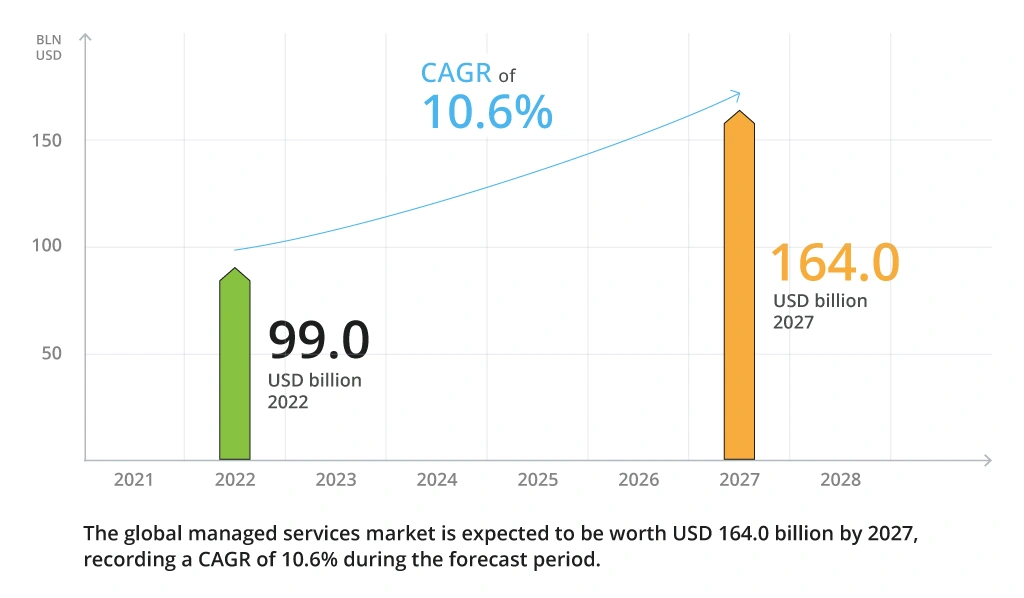Common Cloud Migration Challenges to Overcome with Cloud Managed Services
In this article, you will discover solutions to the typical cloud migration challenges offered by modern cloud managed services. Learn how your organization can benefit from this type of service.
What Are Cloud Managed Services?
Cloud managed services imply the complete or partial management of a company’s cloud infrastructure or resources by a managed cloud service provider (MCSP). MCSPs typically provide a wide range of subscriptions from numerous cloud services. They can serve as a complete replacement for the in-house cloud IT team or be hired as a supplement to internal specialists.
The primary role of cloud managed services is to help enterprises maximize value from using cloud services while minimizing internal time and cost expenses. Such services cover data and applications migration, security management, technical maintenance, and support.
COVID-19 increased the adoption of cloud technology due to the growing popularity of remote working models and business continuity efforts. According to recent MarketsandMarkets research, the market size of cloud managed services will increase from $99 billion in 2022 to $164 billion by 2027 at a CAGR of 10.6%:
The market leaders of cloud vendors and cloud managed services providers are IBM, Microsoft, Cisco, GCP, Accenture, and AWS.
Benefits of Cloud Managed Services
Cloud managed service providers help organizations deal with different technology integration challenges. Here are the main benefits that cause companies to opt for cloud managed services:
- Cost Savings: With the help of dedicated experts, you can design efficient cloud infrastructure addressing all technical requirements and business needs without moving back and forth in the search for an appropriate solution. Cloud network management and maintenance take less time in the long run, which also reduces expenses. Migration to Microsoft Azure cloud helped our client, a big international mining and metal company, save $3M+ on TCO estimated for the next 10 years of operation after.
- Resource optimization: MCSPs determine services that fit your workloads best and choose the pricing models which are the most cost-efficient for your specific needs. Many vendors analyze performance metrics for the existing IT resources to improve configurations and optimize performance while optimizing costs.
- Automatic upgrades: Most MCSPs offer automated updates and cloud infrastructure upgrades that allow faster innovation and keep your system consistently up-to-date.
- Robust security and compliance: modern clouds are designed with safety in mind, utilizing the latest compliance regulations and security tools. With cloud managed services, you can get assistance in choosing the right cloud type and configurations to comply with regulations for your specific industry and type of business.
- Business continuity: cloud managed services ensure the continuity of business operations during migration. While the migration process and maintaining uninterrupted operations are entirely on MCSPs, internal IT teams can focus on driving new business outcomes. This way, Infopulse helped the leading Ukrainian medical distributor to migrate to the cloud without business interruptions. We significantly enhanced the company’s productivity through multi-platform access to corporate data, reinforced security, and newly integrated tools for employees’ cross-communication.
- Resiliency and innovation: Businesses that choose managed cloud services are more resilient since they rely on comprehensive technology platforms with built-in intelligence, automation, and innovative business performance. Experienced managed cloud service providers will also help to take advantage of using the multi-cloud approach that also promotes higher resiliency for business.
- Accelerated productivity: experienced service providers have well-set-up automated migration scenarios, vast expertise in timely issue detection and troubleshooting, and operations automation. All these advancements lead to higher and stabler productivity.
- Disaster recovery support: managed services allow data backup and syncing to retrieve, restore, and re-deploy quickly without system-wide disruptions.
- Rapid response times: managed services provide 24/7 support to resolve detected issues and increase operational efficiency quickly.
In addition, with cloud managed services, it’s no longer your responsibility to find more resources during the peak loads or to scale the business up. Flexibility in resource allocation allows businesses to respond to any changes quickly and effectively.
What Activities Are Typically Included in Cloud Managed Services?
MCSPs cover all services to manage the client’s cloud environment, including:
- Cloud strategy development and implementation: defining strategic vision based on client requirements and a comprehensive roadmap for its implementation.
- Cloud infrastructure configuration: setting up all the hardware and software elements of a cloud environment to ensure seamless interoperability and communication.
- Cloud migration: porting digital assets, applications, and other IT infrastructure elements to the cloud.
- Cloud management and operation: utilizing different ‘as-a-service’ options to ensure the cloud infrastructure serves the client’s business needs, all applications and platform services remain up and running, and all processes perform correctly.
- Cloud optimization: adjusting cloud operations to a client’s digital transformation strategy, optimizing operational costs and resources.
- Cloud security: maintaining security on the highest level to ensure protection from outer cyberattacks and internal threats.
- Cloud maintenance and technical support: 24/7 monitoring and troubleshooting of various incidents, timely system updates, and upgrades. Explore how qualified maintenance support services from Infopulse helped our client, an international financial services company, enhance their customer satisfaction and streamline business operations.
MCSPs also offer expert consultancy services to help customers identify their digital transformation needs, recommend suitable cloud solutions, and specify the required investments.
How Managed Services Address the Key Cloud Migration Challenges?
Cloud managed services appeared to simplify the adoption of cloud technology for organizations on their way to digital transformation. With their help, you can address numerous cloud migration challenges. Here are the most typical issues that companies can eliminate by opting for a cloud managed service.
Challenge #1: Lack of Migration Plan
Transitioning to a cloud without a clear migration plan is the way to fail. Moving critical business infrastructures and assets to the cloud requires planning and brainstorming. Choosing the right migration method, configuring the future cloud infrastructure, and arranging data migration without business disruption and risks to data security and integrity require proper analysis and planning.
Solution: Managed service providers offer building a detailed cloud migration strategy working tightly with the on-site IT team, analyzing the specifics of the current ecosystem configurations, demands, and needs of the business. This way, Infopulse implemented a hybrid cloud infrastructure for a large media holding with 3,000+ employees.
Challenge #2: Application Ecosystem Knowledge Gaps
While migrating different applications to a cloud, it’s crucial to trace every connection between them and how they interact in the ecosystem. However, organizations often lack a properly documented interconnection map for all its applications which causes risks during migration.
Solution: Cloud managed services providers apply different discovery tools to connect existing servers and give a clear picture of active connections between various applications in the ecosystems. Based on a cloud readiness assessment, the experts can gain efficient ecosystem migration with all dependencies in place. Another solution is implementing a demo testing of the chosen cloud infrastructure before deploying the full-scale implementation. Infopulse used this approach to implement an Azure-based cloud infrastructure for a #1 food retail company from Ukraine.
Challenge #3: Data Format Challenges
All the data must be formatted appropriately for accurate migration. Often the protocols for an on-premises database do not match those for the new cloud-based online environment. If they do not match, you may need proper API connectors to migrate the data to a new location. Matching data formats between old and new environments adds complexity to the migration process.
Solution: To address data formatting issues and automate migration, managed cloud services providers apply industry-leading tools. MCSPs ensure the data will operate correctly on the target cloud location using the proper API for each migrated database. Additionally, automation reduces human error risks.
While implementing AWS infrastructure for a big Nordic logistics and supply chain company, Infopulse experts performed an in-depth analysis of existing databases to define which ones require complete or partial redesign for correct operation in the new environment. Within this preparation step, migration was performed correctly and securely to all operations and data structures.
Challenge #4: Application Dependency Mapping Challenges
Applications operate in tight connection to associated databases. To ensure issue-free operation after migration, the enterprise has to remap every app, workload, and database. Any errors on this step may lead to cloud deployment faults.
Solution: Managed cloud service providers assess the current environment to get a clear picture of all application and database dependencies. It allows planning required mapping changes and ensures that each database will be appropriately mapped to the new cloud location. In this way, Infopulse seamlessly migrated a complex IT infrastructure to Azure cloud for a French IT service provider.
Challenge #5: Security Challenges
Companies are deeply concerned about cloud hosting security and the integrity of their data during the transition. Issues in data privacy or integrity are critical for any business. That is why ensuring the top security level during and after cloud migration is the top priority.
Solution: To address all potential security issues, managed cloud service providers use the entire range of security tools available today. The right MCSP must provide effective vulnerability assessment and management services and tools for protecting the network from intrusions, such as firewalls, antiviruses, data encryption, automated security patching, and efficient environment monitoring systems. They also offer a proactive incident response and disaster recovery. In one of our recent projects for a leading Ukrainian pharmaceutical company, we enhanced the security and reliability of the client’s IT systems and infrastructure.
Challenge #6: Regulatory Challenges
Regardless of the type of environment, data fall under compliance regulations, and companies must meet them and build their migration process appropriately. The regulatory landscape of cloud computing is highly complex and causes concerns for organizations that adopt cloud technology for business.
Solution: MCSPs that follow compliance requirements provide 24/7/365 visibility of all applications and data and ensure adherence to regulations. To eliminate compliance issues, rely on providers that offer broad network connectivity and can perform any data routing within the required region of compliance. At Infopulse, the managed cloud services team acts strictly in the client’s compliance environment. In our cloud migration project for the second-largest European company, we improved compliance by restricting access to end-users personal information.
Key Takeaways
Moving the enterprise IT infrastructure to the cloud implies the significant potential for migration failures. With all the technological differences between on-premises server infrastructure and cloud environment, it is no wonder that businesses experience numerous concerns on their cloud journey.
Nevertheless, benefits from using the cloud for business growth as the final goal drive companies to search for reliable approaches. With the assistance of a competent managed cloud services provider, you can effectively address all cloud migration risks and migrate the most critical and sensitive workloads securely, avoiding business interruptions or performance issues. At Infopulse, we provide cloud managed services for projects of any scale. We help businesses maximize benefits from a cloud operational environment and strengthen business continuity by seamless migration without affecting business processes.
![Common Cloud Migration Challenges [banner]](https://www.infopulse.com/uploads/media/common-cloud-migration-challenges to-overcome with-cloud-managed-services-2023-02-22_1920x528-1.webp)

![Identity and Access Management for a Media Holding [banner]](/uploads/media/Promo-banner-identity-and-access-management-upgrade-for-a-large-media-holding-blog-280x183.webp)


![Cloud-Native for Banking [thumbnail]](/uploads/media/cloud-native-solutions-for-banking_280x222.webp)
![Generative AI and Power BI [thumbnail]](/uploads/media/thumbnail-280x222-generative-AI-and-Power-BI-a-powerful.webp)
![Cloud Native vs. Cloud Agnostic [thumbnail]](/uploads/media/thumbnail-280x222-cloud-agnostic-vs-cloud-native-architecture-which-approach-to-choose.webp)
![DevOps Adoption Challenges [thumbnail]](/uploads/media/thumbnail-280x222-7-devops-challenges-for-efficient-adoption.webp)
![Azure Monitor for SAP [thumbnail]](/uploads/media/thumbnail-280x222-azure-monitor-for-sap-solutions-an-overview.webp)

![Mortgages Module Flexcube [Thumbnail]](/uploads/media/thumbnail-280x222-Secrets-of-setting-up-a-mortgage-module-in-Oracle-FlexCube.webp)
![Digital Alignment Drivers [thumbnail]](/uploads/media/thumbnail-280x222-the-top-forces-driving-digital-alignment.webp)
![AWS vs. Azure Cloud Platform [Thumbnail]](/uploads/media/thumbnail-280x222-comparison-of-aws-vs-azure-when-each-cloud-platform-works-best.webp)
![Cloud-Native Maturity Model Assessment [thumbnail]](/uploads/media/thumbnail-280x222-what-Is-the-cloud-native-maturity-model-definition-and-assessment-criteria.webp)